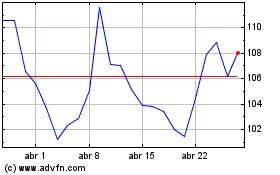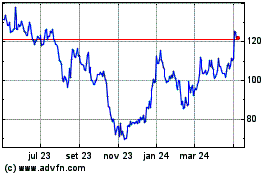By Inti Pacheco
Executives and directors at Pfizer Inc., Moderna Inc. and other
companies developing Covid-19 vaccines sold approximately $496
million of stock last year, reaping rewards of positive vaccine
developments that drove up the value of the drugmakers' shares.
Executives and directors at the same 13 companies sold about
$132 million of stock in 2019, according to insider transaction
data from research firm Kaleidoscope. More than 8.5 million shares
were sold last year by insiders at these companies, compared with
4.7 million shares in 2019.
In dollar terms, much of the sales came at a single company,
Moderna, maker of one of two Covid-19 vaccines authorized for use
in the U.S. Executives and a director there sold more than $321
million of their stock in more than 700 transactions. Merck &
Co. insiders sold $58 million of their shares. At Novavax Inc.,
executives sold more than $40 million of their shares after the
company's vaccine hit milestones in August and September.
Merck, which last May said it was pursuing two vaccines,
scrapped those efforts last month after data showed disappointing
immune responses. Novavax announced positive results of its
clinical trials last month.
Some of the sales toward the end of last year have drawn the
attention of government officials, with the then-head of the
Securities and Exchange Commission calling for new restrictions on
the trading plans under which many of the sales were made.
Corporate compensation experts say these kinds of sales are the
natural consequence of a long-term shift to using stock for a
greater share of executive pay, with the goal being to tie pay to
performance -- in this case the development of life-saving
vaccines. Top company officials, like other investors, may be
disinclined to leave profits on the table, as long as they adhere
to insider-trading rules, some consultants say.
"This is behavior that I would expect to see in most of these
companies, " said Ben Silverman, director of research at
InsiderScore, which analyzes transactions by corporate insiders.
While Mr. Silverman described some of the selling as aggressive, he
said it isn't unusual, particularly for young companies like
Moderna whose executives have seen the value of their holdings jump
dramatically.
Some of the selling was part of preset trading plans that were
established before the pandemic. The rest was mostly part of preset
trading plans that were changed or adopted after vaccine
development was under way. Those changes allowed for more selling
in the second half of the year when positive news about the
vaccines was coming out.
Preset trading plans often are set up to allow officers who
might have access to nonpublic information to sell shares without
exposing themselves to charges of insider trading. The so-called
10b5-1 plans can set prices or other thresholds that trigger
automatic sales when reached. Some plans require a "cooling-off
period" between the time the plan is implemented and the first
trade.
Novavax said its executives adhere to the laws of company stock
sales and have sold a fraction of their overall holdings in the
company. Pfizer didn't respond to requests for comment. Merck
didn't provide any comment.
Companies aren't required to disclose these plans, though they
often disclose when a transaction is tied to a plan in the interest
of providing legal protection for the seller, said Mr.
Silverman.
"As an investor, what you want to look out for is that
opportunistic behavior where people are targeting specific prices,
increasing the pace of selling at a higher price or these examples
where there are significant changes in behavior," he said.
Executives sell stock for a variety of reasons that can be
unrelated to developments at their companies, including
diversification, estate planning and setting aside money for
college tuition.
At Moderna, 17% of the dollar amount of the transactions, or
about $56 million, was part of 10b5-1 trading plans established
before 2020 that weren't updated last year, according to a Wall
Street Journal analysis of securities filings. Some Moderna
executives amended their 10b5-1 trading plans or established new
ones in March, May and June of last year, after trials for the
vaccine started and after the company received government funding
to speed up its development.
A spokesman for Moderna said all executive sales are made under
10b5-1 trading plans. In August, executives and directors agreed
not to enter into new plans, add shares to existing plans or engage
in additional unscheduled sales, the spokesman said. In December,
the company once again allowed trading through new or modified
preset trading plans, following the disclosure of efficacy numbers
for its Covid-19 vaccine.
Chief Executive Stéphane Bancel sold $98 million of his shares
last year. He had been selling an average 86,000 shares a month
last year until June, after which the pace of share sales doubled.
Mr. Bancel's sales represented less than 10% of his holdings, the
company said.
In November, Pfizer CEO Albert Bourla sold about $5.6 million in
company shares -- about 60% of his holdings at the time -- on the
same day the company announced positive results from its Covid-19
vaccine, which the FDA authorized for emergency use in the U.S. in
December. Pfizer said at the time that the sale was part of Mr.
Bourla's personal financial planning and relied on a 10b5-1 plan.
Mr. Bourla authorized the sale in February 2020 and renewed the
authorization in August with identical price and volume terms, the
company said.
Big-ticket stock sales at Pfizer, Moderna and elsewhere have
come under scrutiny from some investors and government officials.
In November, the head of the SEC called for new restrictions on
trading under these plans. "For senior executive officers using
10b5-1 plans to sell stock, I do believe that a cooling-off period
from the time that the plan is put in place or is materially
changed, until the first transaction, is appropriate," then-SEC
Chairman Jay Clayton said at a Senate hearing.
Merck Chairman and CEO Kenneth Frazier sold $23 million in stock
in November, while the company's vaccine candidate was in clinical
trial. His trades weren't attributed to a trading plan, unlike all
of his other transactions since October 2015. The selloff
represented 40% of his vested stock at the time.
Novavax executives sold $23 million of shares in August a day
after the company announced the beginning of the second phase of
its clinical trial. The August sales weren't attributed to a
trading plan in securities filings.
In late September, executives at Novavax sold another $19
million in shares days after entering phase three of the clinical
trial for its vaccine candidate. Securities filings from the last
week of September tied the sales to a trading plan but didn't
disclose when the plan was set up.
Moderna and Pfizer insiders who set up preset trading plans last
year all had cooling-off periods of less than three months. Novavax
insiders didn't disclose dates for the adoption of their preset
trading plans. Most of Merck insiders' sales weren't tied to such
trading plans, and the ones that were didn't include dates for the
plans.
Moderna's spokesman said the company requires that any new or
revised 10b5-1 plans are subject to a significant cooling-off
period before any transactions under those plans can be triggered,
but didn't say how long.
Theo Francis contributed to this article.
Write to Inti Pacheco at inti.pacheco@wsj.com
(END) Dow Jones Newswires
February 17, 2021 05:44 ET (10:44 GMT)
Copyright (c) 2021 Dow Jones & Company, Inc.
Moderna (NASDAQ:MRNA)
Gráfico Histórico do Ativo
De Mar 2025 até Abr 2025

Moderna (NASDAQ:MRNA)
Gráfico Histórico do Ativo
De Abr 2024 até Abr 2025
